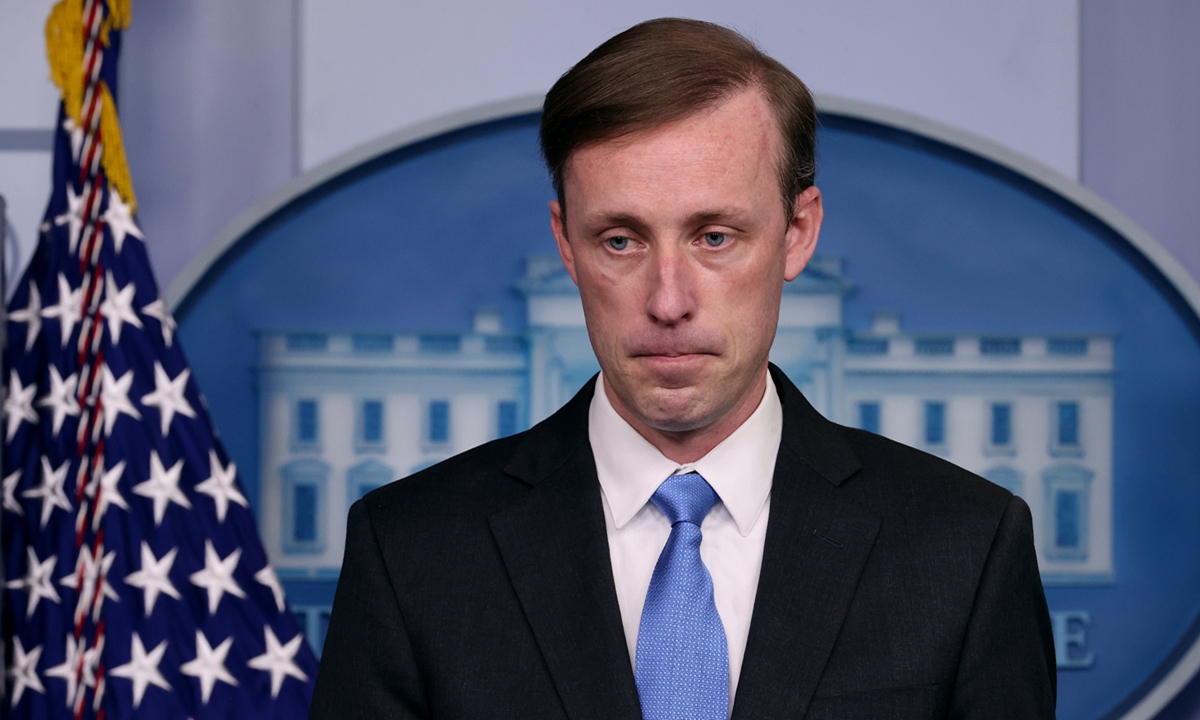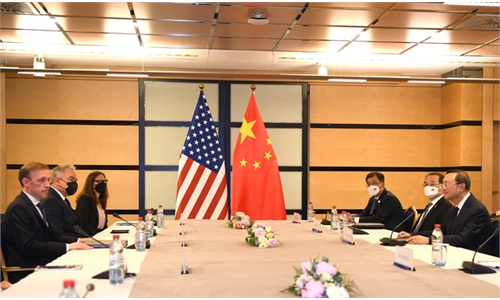Sullivan reiterates ‘one-China policy’ as US in domestic chaos seeks to ‘stabilize ties’ with China

US National Security Advisor Jake Sullivan Photo: AFP
US National Security Advisor Jake Sullivan on Thursday reiterated that the Biden administration's stance on the Taiwan question "has not changed from previous presidencies," the first statement of its kind since a recent meeting between Sullivan and China's top diplomat Yang Jiechi in Luxembourg.
Chinese experts said if the US still cares about the overall stability of China-US relations, it should exercise restraint on China's internal affairs and core interests, and face up to the possibility of lifting tariffs on Chinese products amid pressing domestic economic difficulties.
Sullivan made the remarks during a speech at a virtual conference on national security hosted by the Center for New American Security (CNAS), a hawkish Democratic think tank. On the same day, citing sources, Bloomberg said US officials were working to arrange a possible call this summer between the presidents of China and the US, emphasizing the importance of putting "guardrails" on ties.
During the CNAS conference, Sullivan explained the US' "one-China policy" with diplomatic files like the China-US three joint communiqués, the "Taiwan Relations Act," and "six assurances." He claimed the US now faces Beijing's growing activities that threaten peace and stability across the Taiwan Straits, and the above texts served well in maintaining peace and stability, media reported.
Sullivan talked with Yang Jiechi on June 13, when the latter warned the US should not have miscalculations or illusions on the Taiwan question, saying that if inappropriately handled, it will have a disruptive effect. The two agreed to strengthen communication and dialogue, reduce misunderstandings and miscalculations, and properly manage differences. Yang is a member of the Political Bureau of the Communist Party of China (CPC) Central Committee, and director of the Office of the Foreign Affairs Commission of the CPC Central Committee.
Sullivan's remarks about the US' Taiwan policy signaled that Washington believes the political foundation for stable China-US ties has not been damaged substantially, a Beijing-based international relations expert told the Global Times, requesting anonymity.
Despite Washington repeatedly stating that its "one-China policy" has remained unchanged, its actions have shown that it is trying to change the Taiwan Straits status quo, the expert said.
Since Washington has certain expectations for the stability of China-US relations, China will focus its observation on whether US words will be carried out, he said.
Given the difference between the US' "one-China policy" and the real one-China principle, Sullivan's comments and the leaders talk plan should be seen as the Biden administration seeking to stabilize relations at a time when it faces severe problems at home.
China has never accepted the so-called Taiwan Relations Act and the six assurances under US "one-China policy," said Lü Xiang, a research fellow at the Chinese Academy of Social Sciences. "Sullivan did not soften the expression over the Taiwan question, but also did not further use irritating language."
He said the embattled Biden administration is facing a saga of serious economic problems, including inflation and a depressed stock market, before the 2022 midterm election, amid the confrontation with two nuclear powers, China and Russia.
The Biden administration cannot solve these problems on its own. But both recent speeches by Secretary of State Antony Blinken and Sullivan sidestepped the important question of the China-US economic relations, Lü told the Global Times on Friday.
The US has shied away from trade and tariffs issues between China and the US, which matter to American livelihood, as it does not want to expose its weaknesses too much to China, Lü said.
If the US wants to improve ties with China, trade can serve as a starting point. Even if the US would only lift part of the tariffs out of its own needs, China will welcome it, said Lü, noting that there is also room for cooperation at the macro level on US domestic economic issues.
But the National Security Council led by Sullivan was mistakenly given significant power over trade policy, which led to the politicization of trade issues at the expense of marginalization of experienced people like Treasury Secretary Janet Yellen, experts said.
"Unfortunately, US policy is like a torn jacket full of lice… Uncle Sam feels cold when he takes it off, and gets bitten by lice when he puts it on," Lü said.
Compared with the difficult periods in China-US relations, this contradiction is more like the difficult period in the decision-making of the White House itself. And the root cause is that the US wants everything, but no country can achieve everything on its wish list, the expert said.


